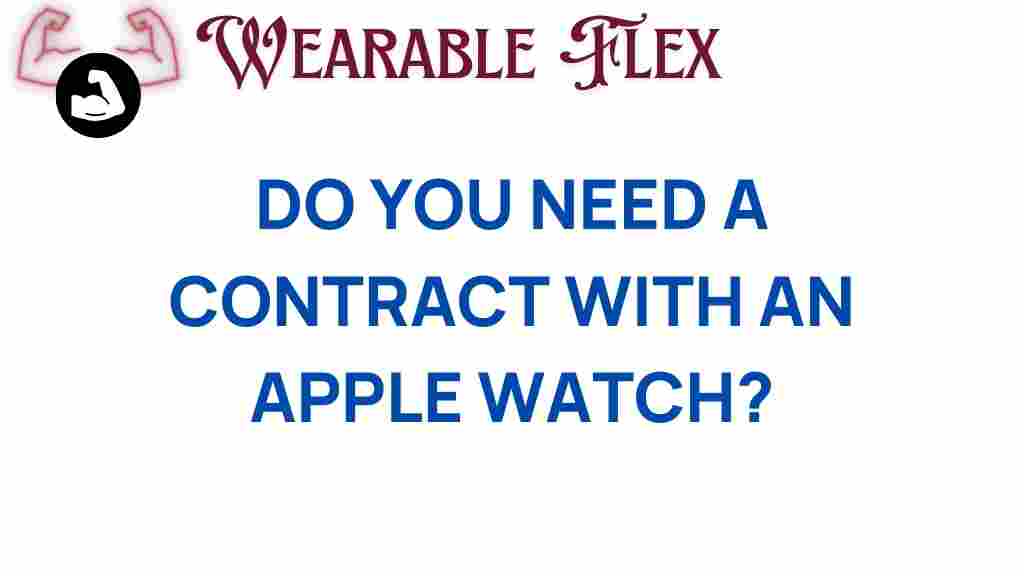Do You Really Need a Contract with an Apple Watch?
The Apple Watch has revolutionized the way we interact with technology on our wrists, offering a blend of style, functionality, and convenience. However, when considering an Apple Watch, many potential buyers wonder: Do you really need a contract with an Apple Watch? In this article, we will delve into the essentials of owning an Apple Watch, the implications of contracts, and whether you truly require one for your smartwatch experience.
Understanding the Apple Watch
The Apple Watch is more than just a timepiece; it’s a comprehensive health and fitness tracker, a communication device, and an extension of your iPhone. With various models and features, it caters to a wide range of users. Here are some key points to consider:
- Models Available: The Apple Watch comes in several models, including the Series 8, SE, and Ultra, each offering unique features and price points.
- Health Tracking: Features include heart rate monitoring, ECG, blood oxygen measurement, and fitness tracking.
- Connectivity: The Apple Watch can connect to Wi-Fi, Bluetooth, and cellular networks, which opens up different usage scenarios.
Do You Need a Contract for Cellular Models?
One of the most significant decisions when purchasing an Apple Watch is whether to opt for a GPS model or a GPS + Cellular model. The latter allows you to use cellular networks to make calls, send messages, and stream music without needing your iPhone nearby. Here’s where contracts come into play:
- Cellular Plans: If you choose the GPS + Cellular version, you will need a cellular plan, which typically involves a monthly contract with your carrier.
- Costs: Cellular plans can add to your monthly expenses, so it’s crucial to evaluate your usage needs.
In contrast, if you opt for the GPS-only version of the Apple Watch, you do not need a contract, making it a more budget-friendly option.
The Benefits of Having a Contract
For those who choose the GPS + Cellular Apple Watch, a contract can bring several advantages:
- Independence: With a cellular plan, your Apple Watch can operate independently from your iPhone, allowing you to stay connected even when your phone is out of reach.
- Convenience: You can receive calls, respond to messages, and access apps directly from your wrist, making it ideal for active lifestyles.
- Family Sharing: Some carriers offer family plans that can reduce costs if multiple family members have cellular-enabled devices.
Considerations Before Signing a Contract
While contracts can offer benefits, it’s essential to weigh the pros and cons:
- Cost: Monthly fees for cellular service can add up over time. Evaluate whether the added convenience is worth the expense.
- Usage: Consider how often you will use your Apple Watch independently. If you primarily use it when your iPhone is nearby, a GPS model may suffice.
- Carrier Options: Different carriers offer varying plans and prices, so it’s wise to shop around before making a decision.
Step-by-Step Process: Getting an Apple Watch with a Contract
If you decide that a cellular model is right for you, here’s a step-by-step guide to obtaining an Apple Watch with a contract:
Step 1: Research
Start by researching the different Apple Watch models available. Look at the features of the GPS + Cellular models versus the GPS-only models to determine which best suits your needs.
Step 2: Choose a Carrier
Next, compare the cellular plans offered by various carriers. Look at:
- Monthly fees
- Data limits
- Family plan options
- Contract length
Step 3: Purchase Your Apple Watch
Visit your chosen carrier’s store or their website to purchase your Apple Watch. If you are buying online, ensure that you select the correct model and plan.
Step 4: Set Up Your Cellular Plan
After purchasing, follow the instructions provided to activate your cellular plan. This usually involves:
- Entering your account details
- Linking your Apple Watch to your existing phone number
- Configuring settings on your iPhone to facilitate the connection
Step 5: Enjoy Your Apple Watch
Once set up, you can begin using your Apple Watch to its full potential. Explore the various apps, fitness features, and notifications that come with your new smartwatch.
Troubleshooting Tips
Sometimes, users may face issues with their Apple Watch, especially with cellular connectivity. Here are some troubleshooting tips:
Issue 1: Apple Watch Not Connecting to Cellular
If your Apple Watch isn’t connecting to cellular, try the following:
- Ensure your watch is properly set up with your carrier.
- Restart both your iPhone and Apple Watch.
- Check for any software updates for both devices.
Issue 2: Poor Battery Life
If you notice your Apple Watch is running out of battery quickly, consider these tips:
- Disable background app refresh for unnecessary apps.
- Reduce the brightness of your display.
- Limit notifications to essential apps only.
Issue 3: Syncing Issues
If your Apple Watch isn’t syncing with your iPhone, ensure:
- Your iPhone is within range of the watch.
- Bluetooth is enabled on your iPhone.
- Both devices are updated to the latest software version.
Conclusion
In summary, whether you need a contract with an Apple Watch largely depends on your lifestyle and how you intend to use the device. If you choose the GPS + Cellular model, a contract can provide significant benefits, including independence and convenience. However, if you’re primarily using your Apple Watch in conjunction with your iPhone, a GPS model may be more cost-effective without the need for a contract.
Ultimately, it’s essential to evaluate your needs and preferences before making a decision. For further insights on the Apple Watch and its features, you can check out Apple’s official page on the Apple Watch models. Happy exploring!
This article is in the category Gadgets and created by WearableFlex Team
